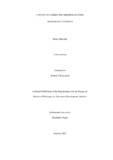
Please use this identifier to cite or link to this item:
https://hdl.handle.net/20.500.14301/86| Title: | A STUDY ON CAREER PREPAREDNESS BY FOOD TECHNOLOGY STUDENTS |
| Authors: | Shrestha, Meera |
| Citation: | Shrestha, M. (2022). A study on career preparedness by food technology students. [Unpublished dissertation], Kathmandu University. |
| Issue Date: | 12-Oct-2022 |
| School: | SOED |
| Department: | DODE |
| Level: | M.Phil. |
| Program: | MPhil in Development Studies |
| Abstract: | Food science and technology is one of the technical fields that seeks to educate students for potential careers after graduation. The food programs are designed to provide theoretical and practical training in processing, preservation, storage, value addition, and quality control of food products. The main objective of the programs is to equip students with the knowledge and abilities necessary to compete as qualified, well-educated candidates in the job market. Career preparedness is a key issue among students pursuing a successful career. Colleges and universities state that they aim for students' career preparedness; however, after completing a degree, students have been facing problems in performing work-related tasks. This study aims to find food student confidence related to career preparation, learning experiences, and supports and barriers system in career preparation. The key research question of this study is how food technology students think about their future. It investigated how food students relate their learning activities and experiences with their future careers. According to the Social Cognitive Career Theory (SCCT) tested in this study, self-efficacy, outcome expectations, and goals are ii associated. In this study, SCCT is tested on the career preparedness of food technology students. A customized questionnaire was used in this survey of 146 students of food technology (70.5 % females and 29.5% males) studying at the undergraduate level. Statistical tools and techniques like correlation, t-tests, and analysis of variance (ANOVA) were utilized to examine the collected data using the statistical program for the social sciences (SPSS) 25.0. The result of the study showed that learning experience, social support, and educational environments help students in career preparedness. The study has various implications for the future. Firstly, educational institutes and universities may benefit from the result of the current study while revising the curriculum of various technical subjects. The study pinpoints their weaknesses from the perspective of career preparedness. Secondly, particularly in the context of Nepal, the study might be helpful for other researchers who are researching career readiness in the same profession or other fields. Thirdly, by understanding how their study is connected to vocational readiness and ultimately to a successful career in the future, students of technical subjects, particularly, food science and technology, may benefit themselves |
| URI: | http://101.251.6.110:8080/handle/20.500.14301/86 |
| Appears in Collections: | Dissertations |
Files in This Item:
| File | Description | Size | Format | |
|---|---|---|---|---|
| MPhil_Dev_Studies_Meera Shrestha.pdf | 1.54 MB | Adobe PDF |  View/Open |
Items in DSpace are protected by copyright, with all rights reserved, unless otherwise indicated.